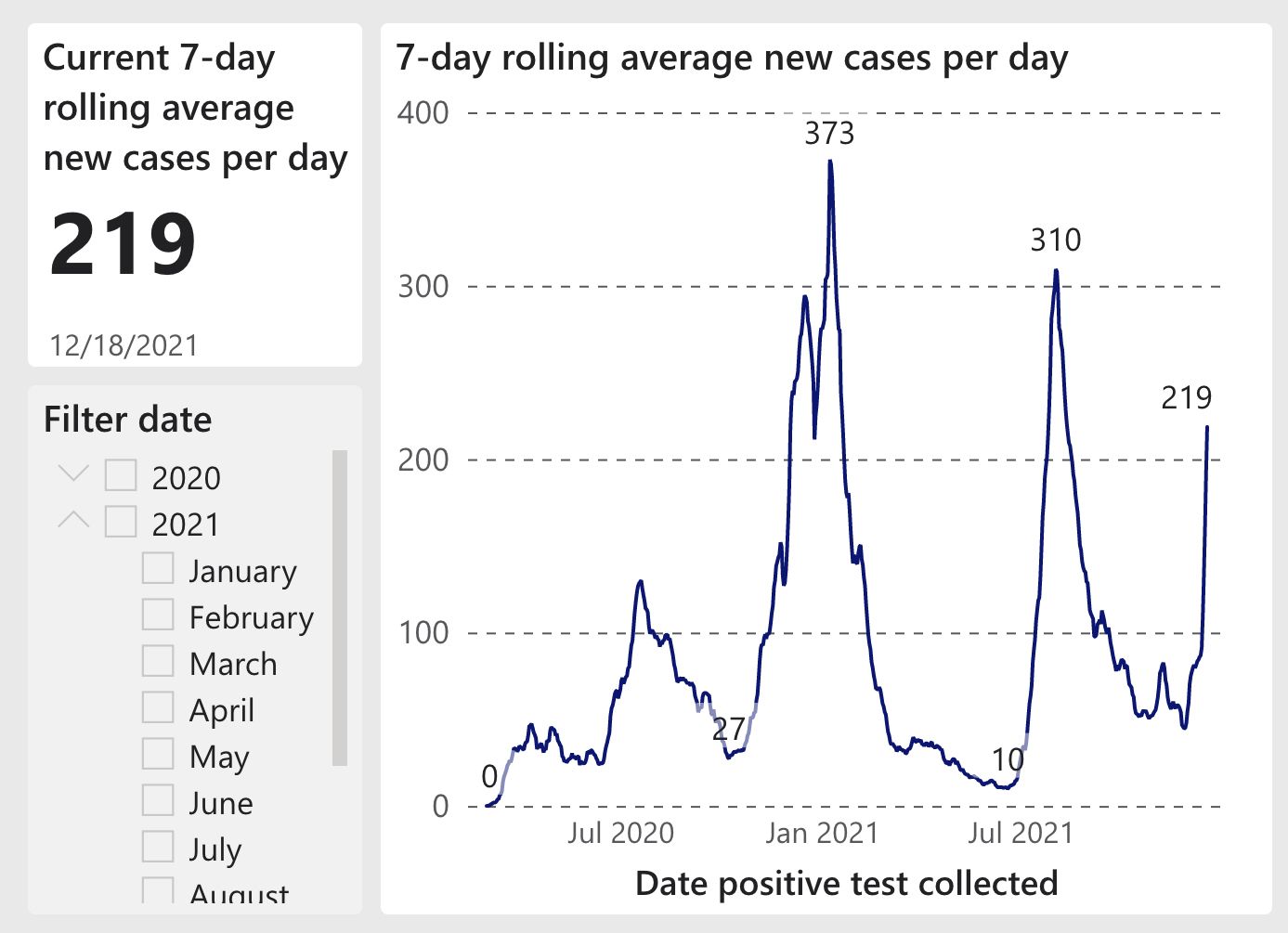While the data from the city remains five days behind, San Francisco is experiencing a COVID surge right now that will likely eclipse last winter's in sheer numbers — but hopefully not in hospitalizations or deaths.
It's been widely established that the Omicron variant is extremely infectious among the unvaccinated and also evades our vaccines even better than the Delta variant. Anecdotally that is playing out in San Francisco in the form of widespread positive tests and mostly mild COVID illness — milder, perhaps, than breakthrough cases from the Delta variant, though the majority of cases are still happening among unvaccinated San Franciscans. In the last two weeks, SF's case numbers certainly reflect a swift rise in infections, and this is likely an undercount, with many people likely taking at-home tests and isolating on their own, without their cases being counted by official labs.
Daily case numbers over the past several days from the SF Department of Public Health (DPH) are higher, in fact, than on any day in the pandemic to date, with only a couple of days in late December 2020 and early January 2021 coming close — and these currently available numbers reflect recorded cases between December 15 and December 21, with more recent case totals not yet public.
On Monday, December 20, there were 562 officially recorded cases in San Francisco (this number is considered by DPH to be unreliable and may go up as more data gets collected in the coming days). On December 21, the current tally of cases is 794, easily the highest single-day number recorded in the city since the COVID pandemic began.
The highest single-day case count in SF during the Delta surge over the summer was 446 on July 29. And prior to that, the high totals were 558 (Jan. 4), and 445 (Jan. 5).
The surge is driving the seven-day average of new cases toward what will likely be a new high point in the pandemic, though we will have to wait until newer data is in. SFist's calculation for the latest seven-day rolling average is 386 as of December 21, which would already be higher than the previous high point of 373 on January 8, 2021.

The hospitalization picture is better, so far, than last winter. However hospitalization numbers, as we know, lag two weeks behind case-count numbers, with many patients not arriving to hospitals until about 10 to 12 days after the onset of symptoms. COVID hospitalizations have ticked up slightly in the last few days statewide, and on Sunday, hospitalizations shot up 11.6% in the Bay Area.
Experts have warned that while Omicron may, on average, cause milder illness than previous variants, this might be canceled out in terms of impact by its extra-high transmissibility — allowing it to reach more vulnerable and/or unvaccinated people and do just as much damage as earlier variants.

The Omicron variant has likely been the culprit in pushing 82.4% of counties nationwide into the CDC's red tier indicating high community transmission, including all counties in the Bay Area.
On Twitter over the weekend, Dr. Bob Wachter at UCSF commented on the case surge and the low hospitalizations in San Francisco so far, noting that this was likely due to "a combination of Omicron’s lower severity hitting SF’s huge wall of vaccination."
And further reinforcing the idea that vaccines — and especially third booster shots — are keeping people from getting very sick, are some observations from Dr. Craig Spencer, an emergency room physician in New York. As Spencer wrote on Twitter on Sunday, he's seen "a lot of COVID in the ER recently," and he therefore has some front-line knowledge of its impacts on vaccinated, boosted, and unvaccinated people.
"Every patient I’ve seen with Covid that’s had a 3rd ‘booster’ dose has had mild symptoms," Spencer says. "By mild I mean mostly sore throat. Lots of sore throat. Also some fatigue, maybe some muscle pain. No difficulty breathing. No shortness of breath. All a little uncomfortable, but fine."
Among patients who had two doses of the Pfizer or Moderna vaccines, he's also seeing mild symptoms, a little worse than in those who were boosted, but still no shortness of breath or anything too terrible.
"And almost every single patient that I’ve taken care of that needed to be admitted for Covid has been unvaccinated," Spencer says. "Every one with profound shortness of breath. Every one whose oxygen dropped when they walked. Every one needing oxygen to breath regularly."
He said that all Americans should listen to him, "as an ER doctor you’d trust with your life if you rolled into my emergency room at 3am," because, "you’d rather face the oncoming Omicron wave vaccinated."
So no matter your political affiliation, or thoughts on masks, or where you live in this country, as an ER doctor you’d trust with your life if you rolled into my emergency room at 3am, I promise you that you’d rather face the oncoming Omicron wave vaccinated.
— Craig Spencer MD MPH (@Craig_A_Spencer) December 27, 2021
Please be safe. ❤️
Photo: Getty Images

